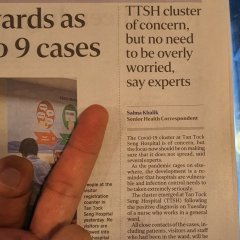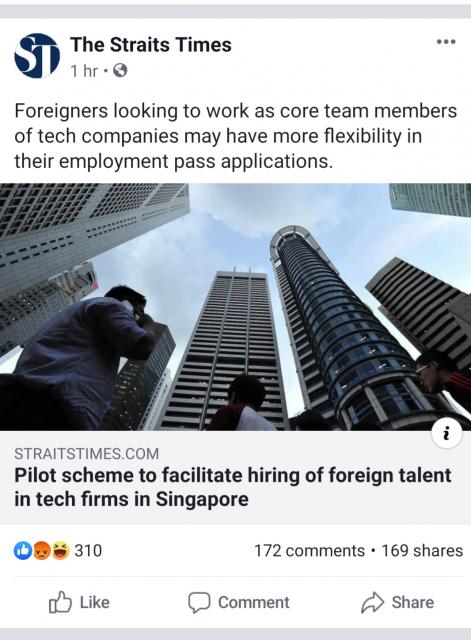Search the Community
Showing results for tags 'foreigners'.
-
looks like 9 years late and maybe hundred of thousands of Singaporean has being affected. Now a change to help the Singaporean. I wonder what has become of us when it takes such a lengthy amount of time to react. https://www.straitstimes.com/singapore/mom-to-update-government-framework-that-deters-employers-from-discriminating-against SINGAPORE - The Government rules that ensure that employers do not discriminate against Singaporean workers by hiring foreigners will be updated this year. Minister for Manpower Josephine Teo announced plans to update the Fair Consideration Framework in a Facebook post on Wednesday (Jan 1). "Expect stronger deterrence for discrimination against Singaporeans when hiring, but also stronger support for employers who are committed to giving our people a fair chance," she said, without giving details of the review. In her Facebook post, Ms Teo spelt out the Manpower Ministry's key milestones in 2019, such as adopting a 10-year road map to raise retirement and re-employment ages. She also noted that workplace fatalities have declined consistently since 2015 and sustained a record low rate of 1.2 per 100,000 workers for the past two consecutive years. The Fair Consideration Framework was introduced in August 2014 on the back of a slowdown in the inflow of foreign workers after Singaporeans voiced unhappiness about them taking away good-paying professional, managerial and executive (PME) jobs from locals. Under the rules then, companies with more than 25 employees must advertise professional, managerial and executive posts that pay less than $12,000 a month. The advertisements need to run for at least 14 days before the firms can apply to the Ministry of Manpower for an Employment Pass (EP) for a foreigner. The framework was last updated in July 2018 to cover firms with more than 10 employees and jobs that pay less than $15,000 a month. Under the framework, firms found to be favouring foreigners in hiring are placed on an MOM watchlist and their applications for EPs are scrutinised more closely. Since 2016, the ministry has placed about 600 firms on the watchlist. A total of 2,300 EP applications have been rejected or withheld by MOM, or withdrawn by employers. Some 260 firms were taken off the watchlist after their hiring practices improved. The Fair Consideration Framework was introduced in August 2014 on the back of a slowdown in the inflow of foreign workers after Singaporeans voiced unhappiness about them taking away good-paying professional, managerial and executive (PME) jobs from locals. Under the rules then, companies with more than 25 employees must advertise professional, managerial and executive posts that pay less than $12,000 a month. The advertisements need to run for at least 14 days before the firms can apply to the Ministry of Manpower for an Employment Pass (EP) for a foreigner. The framework was last updated in July 2018 to cover firms with more than 10 employees and jobs that pay less than $15,000 a month. Under the framework, firms found to be favouring foreigners in hiring are placed on an MOM watchlist and their applications for EPs are scrutinised more closely. Since 2016, the ministry has placed about 600 firms on the watchlist. A total of 2,300 EP applications have been rejected or withheld by MOM, or withdrawn by employers. Some 260 firms were taken off the watchlist after their hiring practices improved.
-
WASHINGTON: China will once again start issuing a range of visas to foreigners as of Wednesday (Mar 15), the country's embassy in Washington said, a major easing of travel restrictions in force since the outbreak of the COVID-19 pandemic. The move marks the latest step towards reopening China to the outside world, as Beijing gradually breaks with the strict zero-COVID strategy that defined its pandemic response until a few months ago. In addition to new travel documents being reviewed and approved, visas issued before Mar 28, 2020 that are still valid will once again allow entry to China, said the embassy notice posted on Monday, translated by AFP from Chinese. The updated policy will also allow for the resumption of visa-free travel for those arriving in cruise ships to Shanghai, as well as for certain tourist groups from Hong Kong, Macao and countries within the ASEAN regional grouping, the notice said. China received 65.7 million international visitors in 2019, according to data from the UN World Tourism Organization, before the pandemic led the country to seal itself off from the rest of the world. While most other countries began fully reopening their economies and welcoming international travelers earlier, China only began emerging from its strict COVID-19 containment policies in late 2022, after rare demonstrations against President Xi Jinping's signature zero-COVID strategy broke out across the country. Those protests in late November expanded into calls for more political freedoms, with some even calling for Xi to resign, turning into the most widespread opposition to communist rule since the 1989 democracy uprising that the military crushed. https://www.channelnewsasia.com/asia/china-lifts-visa-curbs-foreigners-travel-restrictions-covid-19-3344721
- 69 replies
-
https://www.thaipbsworld.com/thais-warned-against-becoming-foreigners-nominees-in-businesses-reserved-for-thai-nationals/ Thais warned against becoming foreigners’ nominees in businesses reserved for Thai nationals January 15, 2023 Thai people who allow their names to be used by foreigners as nominees to open businesses reserved for Thai nationals may face prison terms of three years and/or a fine of between 100,000 baht and a million baht, said Thosapone Dansuputra, director-general of Business Development Department, today. He said that foreigners are not allowed to open businesses selling food or drinks, as he responded to reports that Chinese businessmen had purchased a number of food shops in the Chinatown area. He explained that foreigners who want to open a food shop must get a permission from the Business Development Department, adding that Thai people who co-invest with foreign partners in such business must show their bank accounts, to prove that they have the financial resources to invest and are not just acting as a nominee. To take legal action against foreign businessmen who uses Thais as their nominees, he said that there must be clear evidence that their Thai partners deliberately allowed themselves to be used as nominees and concealed the fact to help the foreigners. Thosapone said that his department has cooperated with the Labour Ministry in checking businesses which have foreigners as partners or shareholders, to find out if the businesses were properly registered.
- 40 replies
-
- 3
-

-
.png)
-
- thailand
- foreigners
-
(and 1 more)
Tagged with:
-
https://www.straitstimes.com/tech/pilot-scheme-to-facilitate-hiring-of-foreign-talent-in-tech-firms?utm_medium=Social&utm_campaign=STFB&utm_source=Facebook#Echobox=1564531412
- 156 replies
-
- 10
-

-
- foreigners
- tech
-
(and 6 more)
Tagged with:
-
Hi to all clubbers of mcf, some news to share..... http://www.reuters.com/article/lifestyleMolt/idUSSIN13347020080625 http://www.topnews.in/foreigners-producing-badly-needed-babies-singapore-249297
- 100 replies
-
- Foreigners
- bolstering
-
(and 3 more)
Tagged with:
-
https://youtu.be/NCiiS-UlXMY?list=PL9hNbo_Ztnr9kyeIy53_uudXtRPTbOjAw&t=1360 Something to ponder.. 22.43min to 27:13min Petter Schiff talked about illegal immigrants in USA and misconceptions people have. He come to explain some of the misconceptions about illegal immigrants take away American jobs and lower down wages. Having listened to his explanation, somehow it also applies to Singapore, replace the word illegal immigrants with foreigners and the whole things makes a lot of sense to Singapore context. People keep complaining foreigners come in Singapore that took away our job and taking down our wages, is that true? Foreigners come in Singapore that took away our job, debate: Not so true as there is unlimited amount of work. There is no limit to the numbers of jobs that can be created. Foreigners come in Singapore that lower down our wages, debate: Not so true, let's assume because there are foreigners come in, Employer can hire foreigners can do things at a lower price then they would have to pay higher if these foreigners won't here. Let's say we are getting an influx of skilled workers, carpenters, plumbers, tailors, mechanics. Let's say your sink is clogged up and you want to call plumbers. If there's more plumbers here and because there is more plumbers, employer can hire plumbers for less money, cost of hiring plumbers goes down. The debate is less money to hire plumbers, more money to spend someplace else. Foreigners help bring down the cost of doing business and ultimately bring down prices and that benefits everyone, its a good idea to have more workers in the economy. There are a lot of foreigners that come to Singapore that jobs that Singaporeans won't do. The only way these job (that Singaporeans won't want to do ) gets down is because these foreigners did them and if these foreigners won't here, the jobs won't get done, and a lot of these companies won't exist here anymore and so a lot of higher paying jobs will go away. Because without lower paying job doing the job, higher paying jobs will not be possible. It is an chicken and egg debate. However, there still need to have foreigners that need to fill up jobs that many Singaporeans do not want to do. Many companies would not have exist if unable to find lower paying workers and likelihood, a lot of higher paying jobs will not be here and many Singaporeans would also suffer.
- 93 replies
-
- 7
-

-
- foreigners
- lower down
-
(and 4 more)
Tagged with:
-
http://www.tremeritus.com/2014/05/25/foreigners-hit-50-5-of-total-workforce/ Foreigners hit 50.5% of total workforce? May 25th, 2014 | Author: Contributions Jobless rate inches up amid tight labour market” (Straits Times, May 1). Singaporeans’ unemployment increases to 3% Click to expand It states that “The unemployment rate for Singapore citizens was 3 per cent last quarter, up from 2.8 per cent, while that for residents – that is, Singapore citizens and permanent residents – was 2.9 per cent, up from 2.7 per cent.” According to the Ministry of Manpower’s (MOM) Employment Situation, First Quarter 2014 report – “There were 3,518,700 persons in employment in March 2014. An estimated 59,300 residents, including 52,300 Singapore citizens were unemployed in March 2014. The seasonally adjusted figures were 62,500 for residents and 55,700 for citizens.” Only 49.5% of total workforce is Singaporeans? So, although there is no breakdown of the employments statistics for residents into Singaporeans and permanent residents (PRs) – if we divide 52,300 unemployed Singaporeans by their 3% unemployment rate – we get 1,743,333 Singaporeans in the workforce. Divide this 1,743,333 by the total employment of 3,518.700, and we get 49.5%. Therefore, does this mean that about 50.5% of the workforce is not Singaporeans? If so, then we may have reached a milestone in our labour statistics – with more than half of the workforce being non-citizens for the first time in Singapore’s history. Whatever happened to the consistent rhetoric in recent years that the influx of foreign labour will be curtailed? 133,033 new citizens = 55% not “Singaporeans”? If we make an adjustment for the 133,033 new citizens granted from 2007 to 2013 – what percentage of the workforce are not originally Singaporeans – about 55% or more? 150th Press Freedom ranking? Finally, don’t you feel that there may be something wrong with the title of the subject news report – “Jobless rate inches up amid tight labour market” – in a tight labour market – shouldn’t the unemployment rate go down instead of up? SY Lee and Leong Sze Hian http://www.tremeritus.com/2014/05/25/foreigners-hit-50-5-of-total-workforce/
- 95 replies
-
- 5
-

-
- foreigners hit 50.5% of total
- foreigners
-
(and 2 more)
Tagged with:
-
Lately I been encountering a lot of reckless scooters weaving in an out of heavy traffic. It seems most of the reckless ones are driven by Caucasians, they drive fast and weave in and out expecting cars to automatically give way. I nearly crushed one that abruptly cut into my lane when the car in front of him jam brake, lucky I also jam brake in time to avoid him otherwise he'll mess up my bumper. Do you guys encounter these idiots on the road? I work in the City which I believe has the highest density of such self indulgent wieners. Also on the rise are idiots on micro scooters on the road.
- 72 replies
-
- 1
-

-
kaoz... wu ya boh? next time will see a PRC/pinoy mata arresting a local?? i strongly object
- 237 replies
-
- 2
-

-
- police
- foreigners
-
(and 2 more)
Tagged with:
-
Yahoo news: Malaysia to charge foreigners more for buying houses in Johor-report KUALA LUMPUR, Oct 8 (Reuters) - Malaysia's southern state of Johor, which neighbours Singapore, will impose a higher processing fee on foreigners who buy houses, state news agency Bernama reported, as it looks to boost revenues and rein in speculative buying. Bernama quoted the state executive councillor for housing and local government, Abdul Latiff Bandi, as saying the state government will charge a fee of 4-5 percent of the property value. Proceeds will go towards welfare projects in Johor. This compares with the current flat fee of 10,000 ringgit ($3,100) per property. Singaporeans have been buying houses in Johor, especially in Iskandar, which is a 2,200 square km (850 square mile) zone three times the size of Singapore and is just across a narrow strip of water. The strong interest also stems from cheaper property prices and utility bills compared with Singapore. The move also comes ahead of potential new measures by the Malaysian government, such as raising the real property gains tax, in the upcoming budget on Oct. 25 to rein in rising housing prices. Property companies that have exposure to Johor include UEM Sunrise, Mah Sing Group, Tropicana Corp and Hong Kong-listed Country Garden Holdings . ($1 = 3.1895 Malaysian ringgit) (Reporting By Yantoultra Ngui; Editing by Chris Gallagher) link: http://sg.finance.yahoo.com/news/malaysia-charge-foreigners-more-buying-014549612.html Change policies like changing clothing daily ....
-
let's hope they just walked into a bar...... Indonesia says four foreigners missing after opening school JAKARTA, Indonesia (AP) -- Four foreigners - an American, Italian, Japanese and Singaporean - were reported missing in Indonesia after opening a language school, a Foreign Ministry spokesman said Wednesday. "Police do not know yet if they were kidnapped, are missing or on the road," said Kristiarto Legowo, adding that they were last known to have been in Surabaya, a major city on Java island, on Tuesday. John C. Taylor, the public affairs officer at the U.S. Consulate General in Surabaya, said in a statement that "we continue to work with Indonesian authorities to try to determine the whereabouts of a U.S. citizen who we are concerned about," but gave no more details. In Japan, Chief Cabinet Secretary Yasuhisa Shiozaki was quoted as saying that Indonesian police had informed consular officials about the disappearance. "I would refrain from making comments because of a lack of details and out of consideration that it could also affect human lives," Shiozaki told Kyodo News agency. Legowo said the four worked for the Berlitz language school.
- 10 replies
-
- Foreigners
- missing
-
(and 1 more)
Tagged with:
-
http://business.asiaone.com/news/johor-rai...ands-foreigners those who bought iskandar jialat lioa ....
- 74 replies
-
COMMENT: Should foreigners be allowed to protest in Singapore? By Kirsten Han | SingaporeScene
- 127 replies
-
- Should
- foreigners
-
(and 3 more)
Tagged with:
-
more good years ahead
- 211 replies
-
Saw this widely circulated video on Facebook of a supposedly drunk man "spilling his heart out" against our foreigners on the MRT and just wanted to share. Haha. Amusing to watch. Almost like a lesson on our history. RESPECT! I'm not sure if you guys can see the link below. http://www.facebook.com/photo.php?v=334827723269047
- 31 replies
-
- Singaporean
- berates
-
(and 1 more)
Tagged with:
-
Good move to reduce FT flooding in and straining our infrastucture. But now we know the reason behind the surge in FTs for the past couple of years. $2800/mth can bring in parents, in-laws, spouse and children? [sINGAPORE] First, higher levies and stricter work pass conditions made it harder for foreigners to work here. Now, foreigners will also find it tougher to keep their families here, under a new rule announced on the Ministry of Manpower's (MOM) website on Monday. For Singaporeans, this move might mean fewer foreigners competing for limited space in local schools, hospitals and trains. But the city-state might also be less attractive to some lower-earning skilled foreigners who will now have to work here without their spouses or children. From Sept 1, MOM said in a posting on its website, S Pass and Employment Pass (EP) holders need to earn at least $4,000 monthly before they can sponsor a Dependant's Pass for their spouses and children. The salary requirement is up from $2,800 previously. The Dependant's Pass is a privilege that allows foreigners to stay here for longer periods of time, and is tied to the duration of the sponsor's work pass. Dependants can also apply for Letters of Consent to work here, without having to apply for a work pass. For all EP holders, their parents-in-law are no longer allowed to stay here. Those earning more under the EP framework will face progressively fewer restrictions. P2 Pass holders, who earn at least $4,500, can bring their spouses and children, but will no longer be able to bring their parents or parents-in-law. P1 Pass holders, who earn at least $8,000, can still bring their parents in addition to their spouses and children - just not their parents-in-law. Meanwhile, P1 and P2 Pass holders can also still apply for long-term visit passes for other categories like common-law spouses, their children, and handicapped children and stepchildren aged above 21. Explaining the changes, MOM said: "The government is making this move as part of the overall direction to moderate growth of the non-resident population, including the foreign workforce inflow, in Singapore. "This will help ease the pressure on our social infrastructure," it said. MOM advised companies not to make a "knee- jerk reaction" to the tightening of dependant privileges, as MOM will continue to approve Dependant's Pass applications before Sept 1. Current dependants can also stay in Singapore as long as the main pass holder has a valid work pass and remains with the same employer. MOM's move is the latest in a series of moves by various ministries to sharpen the privileges of being Singaporean and restrict the influx of foreigners which has strained the city's infrastructure and caused locals considerable angst in the last few years. For example, qualifying salaries for EP holders were raised to $3,000 in January along with stricter educational requirements. Higher foreign worker levies and tighter foreign worker quotas kicked in earlier this month. MOM, however, stressed that Singapore "remains a global talent capital" and continues to welcome highly skilled foreign talent who want families to stay with them. Observers say that the latest change affects young graduates looking to work here who earn wages in the $2,800-$4,000 range. Teo Siong Seng, president of the Singapore Chinese Chamber of Commerce and Industry, said: "I don't understand the rationale. Do support and give priority to Singaporeans, but we must also open up to talented people. Those who are younger and just started work, just married, might be discouraged from coming to work here as it is harder to part from their spouses." Similarly, Annie Yap, managing director of recruiter AYP Associates, said that "quite a lot of foreigners earn in the $2,800- $4,000 range", so the move will deter some from continuing to work here. Others are divided on whether the move will have an impact on Singapore's attractiveness to talent. Singapore National Employers Federation executive director Koh Juan Kiat pointed out that other countries have similar restrictions for dependants. Lim Der Shing, chief executive of online recruitment portal JobsCentral, said that Singapore is such an expensive place to live in anyway that it is likely that only those earning $4,000 and above are bringing dependants in. "For my company, people on S Passes and EPs don't bring their dependants over unless both husband and wife are working," he added. Chan Chong Beng, president of the Association of Small and Medium Enterprises, said the move is a good one. "Our infrastructure today is quite jammed and will need some time to be ready for more people. This will ease the pressure," he said. Ultimately, the move might be good in the short term but may have an unintended consequence in low-fertility Singapore, which is trying hard to solve its demographic problems, said sociologist Paulin Straughan, an associate professor at NUS. She said that the new rule will encourage a "guest-worker" mentality among foreign workers earning less than $4,000 a month. They will more likely be single and willing to work longer hours for lower wages, Prof Straughan said. "We're no longer going to be attractive to married individuals who can fill in the kind of jobs people in that salary range usually take - essentially service sector jobs. "This changes the nature of work. You will have foreigners come in who are single, and their only intention is to make as much money as they can and go home - as, obviously, they are not welcome here," Prof Straughan added. "That's a pity. Because when the entire family is here, the way the guest worker leads his or her family life will be very different. "They will be more like regular Singaporeans, keeping regular hours to have a good work-life balance."
- 23 replies
-
- raised
- foreigners
- (and 4 more)
-
Why Taiwan can protect its people by not selling flats to foreigner we can't? All the taiwan 原住民 who own land or houses are exploit by foreigner who buy their land for cheap till government intervene and passes a law saying that no foreigner are allow to buy those land which they owned. what about us here. PR or foreigner can simply buy and sell for profits. See the article below for buying house in Taiwan. Foreign nationals, who are resident in Taiwan and hold an Alien Registration Card, are allowed to buy residential property in Taiwan, but only if Taiwan nationals are also entitled to buy property in the foreign national's home country, according to the "reciprocity rule". They are required to apply to the Ministry of Economic Affairs for approval of the intended purchase. Foreigners are not generally allowed to buy and sell property in Taiwan for profit, only for personal use or investment purposes. Individuals are usually only allowed to buy one piece of real estate. House prices in Taiwan have recently been increasing steadily, and in the third quarter of 2006, the average price of a residential home was TWD5.88 million (approximately US$181,000). Although this is not as high as in many western countries, prices are higher in Taiwan relative to average income. Prices are not expected to increase rapidly in the near future as there is a glut of properties on the market. Around 87% of Taiwan's population already own their own home. Foreign non-residents are subject to 20% tax on their gross income from sub-letting property in Taiwan, as well as an annual house tax of 1.38% of the current value of the property. Capital gains are subject to a tax rate of 20%. Under the Land Act (amended 2001), annual rents from residential property must be limited to 10% of the value of the property. A change in ownership of property must be registered with the local Land Registration Office. this 3 clause i sure will make them rich arse thinking about buying and loan and earning from our land. 20% tax on their gross income from sub-letting property in Taiwan, as well as an annual house tax of 1.38% of the current value of the property. Capital gains are subject to a tax rate of 20%
-
PUTRAJAYA: Foreigners coming into the country need not fill up arrival cards issued by the Immigration Department starting June 1, the Home Ministry said in a statement. http://thestar.com.my/news/story.asp?file=...&sec=nation
- 43 replies
-
- Foreigners
- need
- (and 5 more)
-
A&E subsidies for foreigners are here to stay: Gan Kim Yong by Ng Jing Yng 04:45 AM Nov 22, 2011SINGAPORE - Subsidies for foreigners needing emergency care are here to stay, Health Minister Gan Kim Yong told Parliament yesterday. He also provided statistics to show that this contributed minimally to the Government's healthcare spending. He was responding to Member of Parliament Baey Yam Keng (Tampines Group Representation Constituency), who had asked if the Government would remove subsidies for foreigners receiving Accident and Emergency (A&E) care or impose means testing - where the patient's ability to pay determines the size of the bill. This is because foreigners here would probably be covered by workplace insurance or travel insurance, he said. Currently, a 50-per-cent subsidy is given to all A&E patients regardless of their nationality. Mr Gan said that, over the last five years, foreigners made up 18 per cent of the yearly patient load at A&E departments - amounting to government subsidies of S$14 million every year. This is less than 1 per cent of the Health Ministry's total spending on subsidised patient services at public hospitals, which amounted to S$2.2 billion. "For A&E services, because they affect life and death, we want to make sure administrative processes in the A&E departments are kept as simple as possible," he said. He pointed out that not all foreigners here have workplace insurance as they are on long-term visit passes. And as A&E departments provide critical attention for a short period of time, getting hospital staff to verify the patient's nationality or doing means testing will only add to their administrative burden, he said. "We still like to keep our A&E departments streamlined (and) focus on treating the patients, ensuring that everyone who comes to A&E receives the emergency treatment that they need," added Mr Gan. As for Singaporeans who need further help even after the 50-per-cent subsidy, Mr Gan cited the existing Medifund scheme and said the Government would continue to look at ways to help the needy.
-
Geezz if a Masai warrior family from Africa or a Eskimo family from eastern Siberia come stay next to me I must go find out what they diet is, their culture and what they do during freetime (hunt lions/seals?). These days really tough being Singaporeans... On top of having to accommodate these FTs unwillingly, one must also tolerate their vocalness plus to learn their culture some more... Pai tan... Later must go downstairs to my new Chengdu neighbour to find out about them and why they like to talk so loud and smoke so many ciggies a day and most puzzling of all, having many of their compatriots coming over their place on Sundays to have a good time and making our small neighborhood a noisy market... But this writter is quite contradicting also when he mentioned foreigners forming their own enclaves and does not mix around with locals. So where does he stand? From ST Forum: http://www.straitstimes.com/STForum/Story/...ory_733000.html Roadblocks to a multicultural Singapore Published on Nov 12, 2011
- 179 replies
-
Cheryl did not attend "integration" classes sponsored by her RC?
- 116 replies
-

System makes it easy to hire foreigners at expense of locals
BoyBoyBalls posted a topic in Lite & EZ
The following is a letter to Minister of State for Manpower Tan Chuan Jin From: xxxx Date: Wed, Nov 2, 2011 Subject: A step in the right direction: discriminatory practices against Singaporeans To: [email protected] Cc: [email protected] Dear Mr. Minister: I just read the article entitled -
From Yahoo News: Local university and junior college students are feeling the heat from foreign students for coveted spots at local universities. They were reacting to the news last week that international students make up 18 per cent of the total undergraduate intake in Singapore's universities for the academic year 2011. The proportion, however, appears to differ across faculties. Foreign students make up a mere one per cent in Medicine and Law courses, but the figure could go as high as 27 per cent in Science and Engineering. Ng Ding Neng, 23, who is currently studying in Nanyang Technological University's School of Physical and Mathematical Sciences (Mathematics and Economics), said international students form around a quarter of his course, and most are from China. In a written reply to MP Ang Wei Neng's queries in Parliament last Friday regarding the foreign student intake in universities, Minister of Education Heng Swee Keat explained that the exceptionally-high intake for Science and Engineering courses is attributed to the fact that they produce much-needed manpower in sustaining key industries but are "less popular with talented Singaporeans", reported Channel NewsAsia. Heng also highlighted that majority of the international students are on the Tuition Grant scheme, which helps to defray their fees. Moreover, they are tied to a bond that requires them to work in Singapore for three years. 25-year-old Farhan Hamid from NUS told Yahoo! Singapore that this generates a double problem, because not only do they take up spaces in universities here, they are also taking up job opportunities for fresh graduates. Another NTU student, Vera Lau Shi Min, 18, said the presence of foreigners drives up the bell-curve and forces local students to step-up and match the standards, or get a lower grade. "As local students, we see our foreign peers as tough competition, which makes us frustrated instead of being a source of motivation. That's because our GPA depends on a bell-curve, hurting our grades as a result," the first-year NTU Sport Science and Management student proclaimed. But is help on the way? In his National Day Rally speech in August, Prime Minister Lee Hsien Loong assured that the government will set aside more places for Singaporeans in universities here and that the foreign enrollment (in absolute numbers) will be capped at present levels. As such, it's expected the proportion of foreign students in local universities will eventually shrink, easing the unhappiness expressed by some who felt it is no longer "Singaporeans first" when it comes to places at local universities. In fact, the percentage of foreign undergraduate intake was slightly higher at 20 per cent from the year 1999 to 2006, according to NUS Professor Dr. Loy Hui Chieh, who gathered information from the Education Statistics Digest Online. In 1997, it was only 10 per cent. Data from 2007 to 2010 are not readily available online. But apart from competition in the classroom, do Singaporean students generally welcome their foreign counterparts in campus life? Foo Jiahui from Nanyang Business School said that having foreigners definitely adds colour to campus life and makes it interesting to mix around with people from different nationalities. Chua Khoon Wee, on the other hand, claimed that interaction between foreign and local students is limited, and foreigners are usually either alone or in their own groups, though there are exceptions. As for local students taking their A' Level examinations in two weeks' time, they are already feeling the intense pressure, as many compete for a limited number of places in universities here. Liu Ting Ting, 18, from Nanyang Junior College, is one of them. "I sincerely hope that the universities could put us students (taking Cambridge paper) as priority over the international students, simply because our mode of testing has proven to be more demanding than SATs and IB papers, and that competition is already tough within us as we compete for our As and Bs," she told Yahoo! Singapore. But 17-year-old ASEAN scholar Ng Zhan Ming from Malaysia urged Singaporeans to be confident about facing competition for university places. "Singaporeans should be happy that these foreigners are actually looking towards Singapore as a premier education hub, and how can Singapore who keeps wanting to 'increase its education standards' not accept more foreign students who might be more academically-inclined?" he questioned. "The universities are already being very strict on foreigners due to political and social pressure," said the Raffles Institution (Junior College) student who scored 10 A1s for his O' Level examinations last year. ============== And from one Singaporean called Desmond: My wife (then-gf) had problem paying school fees during polytechnic times, despite holding two part time jobs. Her dad was sick and not working. Her mum was surviving on $800 a month doing dish washing jobs, and supporting her younger sister who was still schooling. The money earned by the family were mostly used for her poly fees, her sister's fees, the house loan as her dad was self employed with no CPF, etc, leaving them with no savings. Once, my wife had problem paying her fees. She approached for financial help and was rejected. The poly's head approached her reminding her about the fees. She related her situation to the head hoping for some empathy. Shockingly, she was told that they couldnt help and advised her to take up more jobs despite knowing she was already on 2 part time jobs! The point is, aren't those money used for these foreigners be better off helping one of our own?
-
'Foreign workers should get training too', says MP Yeo Guat Kwang Published on Sep 19, 2011 By Lin Wenjian Foreign workers should get skills upgrading similar to what Singaporeans go through, suggested labour MP Yeo Guat Kwang. Noting that this would 'create a level playing field' for all workers, he said training and certification for work permit and S Pass holders should be done within the first two years of their employment. Successful certification should then be used as a condition for work pass renewal, he said. Mr Yeo, speaking to The Straits Times in his capacity as chairman of the Migrant Workers Centre (MWC), said training could be done in two ways - either through in-house courses conducted by employers, or via the Singapore Workforce Skills Qualifications (WSQ) programme. --------------- Alamak, where else can you find a country like Singapore? Help foreigners find work, and help unskilled foreigners to upgrade (most of whom will leave in 2-3 years), and at whose expense?
- 39 replies
-
- Foreigners
- should
-
(and 2 more)
Tagged with:


















